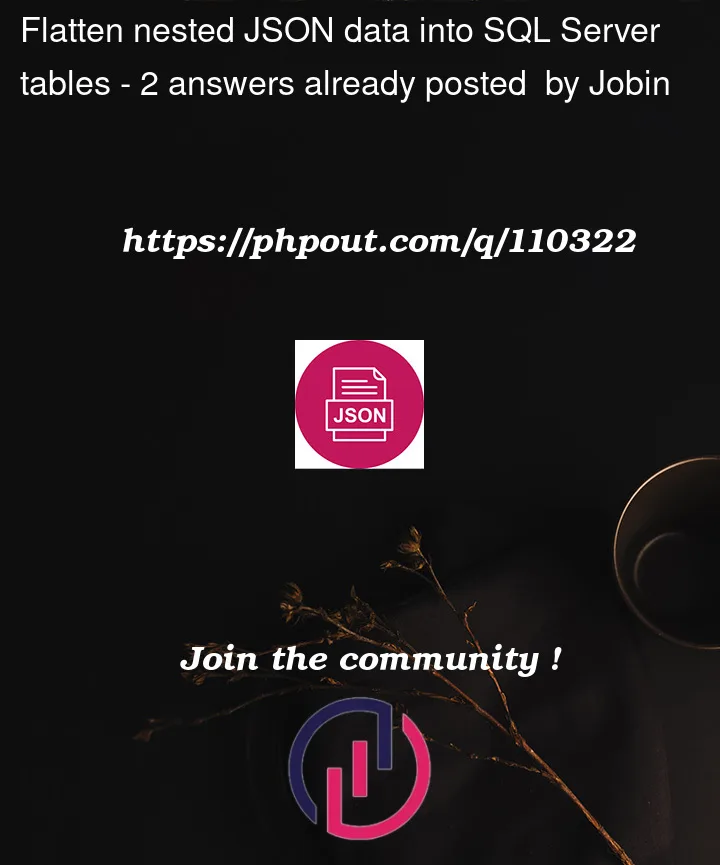I have a JSON file that contains transactions, and each transaction contains multiple items. I need to flatten the data into SQL Server tables using T-SQL.
I have tried different options to flatten it, but it looks like I am missing something. Anyone who has worked on a similar structure have any ideas how this could be accomplished?
DECLARE @json NVARCHAR(MAX);
SELECT @json = JsonPath
FROM [dbo].[stg_transactionsJson] b;
SELECT
CONVERT(NVARCHAR(50), JSON_VALUE(c.Value, '$.orderId')) AS orderId,
CONVERT(DATETIME, JSON_VALUE(c.Value, '$.openTime')) AS openTime,
CONVERT(DATETIME, JSON_VALUE(c.Value, '$.closeTime')) AS closeTime,
CONVERT(NVARCHAR(50), JSON_VALUE(c.Value, '$.operatorId')) AS operatorId,
CONVERT(NVARCHAR(50), JSON_VALUE(c.Value, '$.terminalId')) AS terminalId,
CONVERT(NVARCHAR(50), JSON_VALUE(c.Value, '$.sessionId')) AS sessionId,
CONVERT(NVARCHAR(50), JSON_VALUE(p.Value, '$.productGroupId')) AS productGroupId,
CONVERT(NVARCHAR(150), JSON_VALUE(p.Value, '$.productId')) AS productId,
CONVERT(NVARCHAR(50), JSON_VALUE(p.Value, '$.quantity')) AS quantity,
CONVERT(NVARCHAR(150), JSON_VALUE(p.Value, '$.taxValue')) AS taxValue,
CONVERT(NVARCHAR(50), JSON_VALUE(p.Value, '$.value')) AS ProductValue,
CONVERT(NVARCHAR(150), JSON_VALUE(p.Value, '$.priceBandId')) AS priceBandId,
GETDATE() AS DateUpdated
FROM
OPENJSON(@json) AS c
OUTER APPLY
OPENJSON(c.Value, '$."products"') AS p;
And the sample JSON as follows
{
"orderId": 431,
"openTime": "2022-10-31T13:12:28",
"closeTime": "2022-10-31T13:12:32",
"operatorId": 7,
"terminalId": 4,
"sessionId": 1,
"products": [
{
"productId": 2632,
"productGroupId": 162,
"quantity": 1,
"taxValue": 0.58,
"value": 3.5,
"priceBandId": 2
},
{
"productId": 3224,
"productGroupId": 164,
"quantity": 1,
"taxValue": 0.08,
"value": 0.5,
"priceBandId": 2
}
],
"tenders": [
{
"tenderId": 2,
"value": 4.0
}
],
"type": 1,
"memberId": 1
}




2
Answers
You can Do it like this
First declare the values in an with clause and then cross apply the products
fiddle
The expected output defines the exact statement, but if you need to parse nested JSON content you may try a combination of:
OPENJSON()with explicit schema and theAS JSONmodifier for nested JSONAPPLYoperators for each nested level.T-SQL: